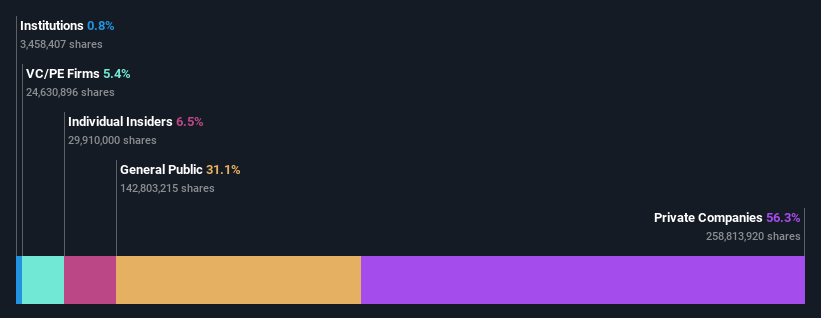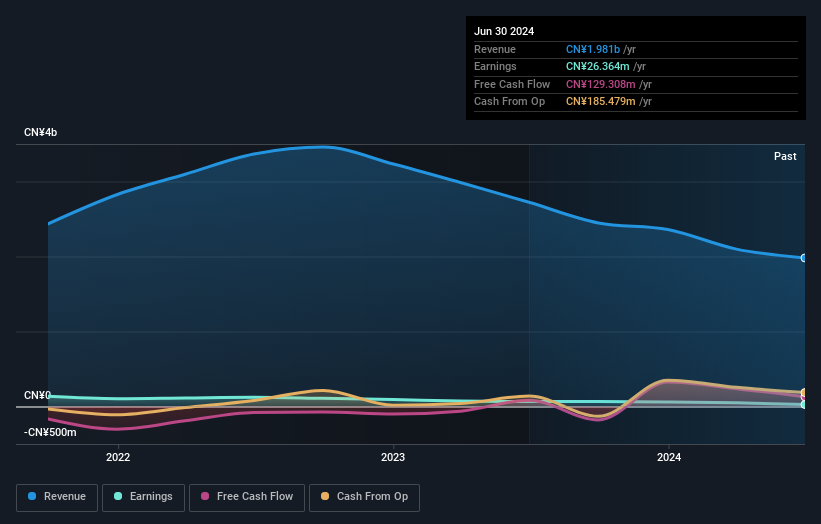Tianjin Guoan Mengguli New Materials Science & Technology Co., Ltd.'s (SZSE:301487) market cap dropped CN¥689m last week; Private companies bore the brunt
Key Insights
- Tianjin Guoan Mengguli New Materials Science & Technology's significant private companies ownership suggests that the key decisions are influenced by shareholders from the larger public
- 52% of the business is held by the top 5 shareholders
- Using data from company's past performance alongside ownership research, one can better assess the future performance of a company
Every investor in Tianjin Guoan Mengguli New Materials Science & Technology Co., Ltd. (SZSE:301487) should be aware of the most powerful shareholder groups. And the group that holds the biggest piece of the pie are private companies with 56% ownership. Put another way, the group faces the maximum upside potential (or downside risk).
And following last week's 6.1% decline in share price, private companies suffered the most losses.
Let's take a closer look to see what the different types of shareholders can tell us about Tianjin Guoan Mengguli New Materials Science & Technology.
View our latest analysis for Tianjin Guoan Mengguli New Materials Science & Technology

What Does The Lack Of Institutional Ownership Tell Us About Tianjin Guoan Mengguli New Materials Science & Technology?
Small companies that are not very actively traded often lack institutional investors, but it's less common to see large companies without them.
There could be various reasons why no institutions own shares in a company. Typically, small, newly listed companies don't attract much attention from fund managers, because it would not be possible for large fund managers to build a meaningful position in the company. Alternatively, there might be something about the company that has kept institutional investors away. Tianjin Guoan Mengguli New Materials Science & Technology might not have the sort of past performance institutions are looking for, or perhaps they simply have not studied the business closely.

Hedge funds don't have many shares in Tianjin Guoan Mengguli New Materials Science & Technology. Looking at our data, we can see that the largest shareholder is Hengtong Group Co.,Ltd with 34% of shares outstanding. Meanwhile, the second and third largest shareholders, hold 5.7% and 5.4%, of the shares outstanding, respectively.
Our research also brought to light the fact that roughly 52% of the company is controlled by the top 5 shareholders suggesting that these owners wield significant influence on the business.
While studying institutional ownership for a company can add value to your research, it is also a good practice to research analyst recommendations to get a deeper understand of a stock's expected performance. As far as we can tell there isn't analyst coverage of the company, so it is probably flying under the radar.
Insider Ownership Of Tianjin Guoan Mengguli New Materials Science & Technology
The definition of company insiders can be subjective and does vary between jurisdictions. Our data reflects individual insiders, capturing board members at the very least. The company management answer to the board and the latter should represent the interests of shareholders. Notably, sometimes top-level managers are on the board themselves.
Insider ownership is positive when it signals leadership are thinking like the true owners of the company. However, high insider ownership can also give immense power to a small group within the company. This can be negative in some circumstances.
We can see that insiders own shares in Tianjin Guoan Mengguli New Materials Science & Technology Co., Ltd.. This is a big company, so it is good to see this level of alignment. Insiders own CN¥695m worth of shares (at current prices). If you would like to explore the question of insider alignment, you can click here to see if insiders have been buying or selling.
General Public Ownership
The general public, who are usually individual investors, hold a 31% stake in Tianjin Guoan Mengguli New Materials Science & Technology. While this size of ownership may not be enough to sway a policy decision in their favour, they can still make a collective impact on company policies.
Private Equity Ownership
With an ownership of 5.4%, private equity firms are in a position to play a role in shaping corporate strategy with a focus on value creation. Some might like this, because private equity are sometimes activists who hold management accountable. But other times, private equity is selling out, having taking the company public.
Private Company Ownership
We can see that Private Companies own 56%, of the shares on issue. It might be worth looking deeper into this. If related parties, such as insiders, have an interest in one of these private companies, that should be disclosed in the annual report. Private companies may also have a strategic interest in the company.
Next Steps:
I find it very interesting to look at who exactly owns a company. But to truly gain insight, we need to consider other information, too. Take risks for example - Tianjin Guoan Mengguli New Materials Science & Technology has 4 warning signs (and 2 which are significant) we think you should know about.
Of course this may not be the best stock to buy. Therefore, you may wish to see our free collection of interesting prospects boasting favorable financials.
NB: Figures in this article are calculated using data from the last twelve months, which refer to the 12-month period ending on the last date of the month the financial statement is dated. This may not be consistent with full year annual report figures.
Have feedback on this article? Concerned about the content? Get in touch with us directly. Alternatively, email editorial-team (at) simplywallst.com.
This article by Simply Wall St is general in nature. We provide commentary based on historical data and analyst forecasts only using an unbiased methodology and our articles are not intended to be financial advice. It does not constitute a recommendation to buy or sell any stock, and does not take account of your objectives, or your financial situation. We aim to bring you long-term focused analysis driven by fundamental data. Note that our analysis may not factor in the latest price-sensitive company announcements or qualitative material. Simply Wall St has no position in any stocks mentioned.
 Index Options
Index Options CME Group
CME Group Nasdaq
Nasdaq Cboe
Cboe TradingView
TradingView Wall Street Journal
Wall Street Journal